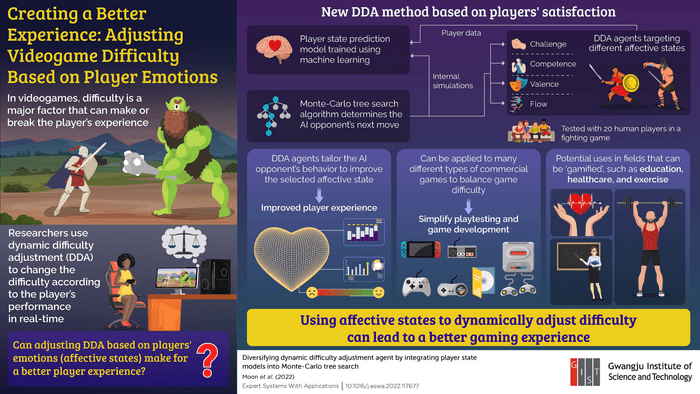Difficulty is a tough aspect to balance in video games. Some people prefer videogames that present a challenge whereas others enjoy an easy experience. To make this process easier, most developers use ‘dynamic difficulty adjustment (DDA).’ The idea of DDA is to adjust the difficulty of a game in real time according to player performance. For example, if player performance exceeds the developer’s expectations for a given difficulty level, the game’s DDA agent can automatically raise the difficulty to increase the challenge presented to the player. Though useful, this strategy is limited in that only player performance is taken into account, not how much fun they are actually having.
In a recent study published in Expert Systems With Applications, a research team from the Gwangju Institute of Science and Technology in Korea decided to put a twist on the DDA approach. Instead of focusing on the player’s performance, they developed DDA agents that adjusted the game’s difficulty to maximize one of four different aspects related to a player’s satisfaction: challenge, competence, flow, and valence. The DDA agents were trained via machine learning using data gathered from actual human players, who played a fighting game against various artificial intelligences (AIs) and then answered a questionnaire about their experience.
Using an algorithm called Monte-Carlo tree search, each DDA agent employed actual game data and simulated data to tune the opposing AI’s fighting style in a way that maximized a specific emotion, or ‘affective state.’ “One advantage of our approach over other emotion-centered methods is that it does not rely on external sensors, such as electroencephalography,” comments Associate Professor Kyung-Joong Kim, who led the study. “Once trained, our model can estimate player states using in-game features only.”
The team verified—through an experiment with 20 volunteers—that the proposed DDA agents could produce AIs that improved the players’ overall experience, no matter their preference. This marks the first time that affective states are incorporated directly into DDA agents, which could be useful for commercial games. “Commercial game companies already have huge amounts of player data. They can exploit these data to model the players and solve various issues related to game balancing using our approach,” remarks Associate Professor Kim. Worth noting is that this technique also has potential for other fields that can be ‘gamified,’ such as healthcare, exercise, and education.
This paper was made available online on June 3, 2022, and will be published in Volume 205 of the journal on November 1, 2022.
Let us hope this study paves the way to games that any type of player, whether hardcore or casual, can enjoy!
***
Reference
DOI: https://doi.org/10.1016/j.eswa.2022.117677
Authors: JaeYoung Moon1, YouJin Choi2, TaeHwa Park2, JunDoo Choi1, Jin-Hyuk Hong2, Kyung-Joong Kim*2
Affiliations:
1Graduate School of Artificial Intelligence, Gwangju Institute of Science and Technology
2School of Integrated Technology, Gwangju Institute of Science and Technology
About the Gwangju Institute of Science and Technology (GIST)
The Gwangju Institute of Science and Technology (GIST) is a research-oriented university situated in Gwangju, South Korea. Founded in 1993, GIST has become one of the most prestigious schools in South Korea. The university aims to create a strong research environment to spur advancements in science and technology and to promote collaboration between international and domestic research programs. With its motto of “A Proud Creator of Future Science and Technology,” GIST has consistently received one of the highest university rankings in Korea.
Website: http://www.gist.ac.kr/
About the authors
Kyung-Joong Kim is an Associate Professor at the Institute of Integrated Technology and Chief of the Game AI Center in Gwangju Institute of Science and Technology (GIST), South Korea. His group is developing human-centered game AI to enhance the gaming experience of human players. Before joining GIST, he served as an associate professor in computer engineering at Sejong University for 10 years. He completed his postdoctoral training at Lipson’s Lab at Cornell University, USA.
JaeYoung Moon is a PhD student at Kim’s lab at GIST.
YouJin Choi is a PhD student at Hong’s lab at GIST.
Journal
Expert Systems with Applications
DOI
10.1016/j.eswa.2022.117677
Method of Research
Computational simulation/modeling
Subject of Research
Not applicable
Article Title
Diversifying dynamic difficulty adjustment agent by integrating player state models into Monte-Carlo tree search
Article Publication Date
1-Nov-2022
















